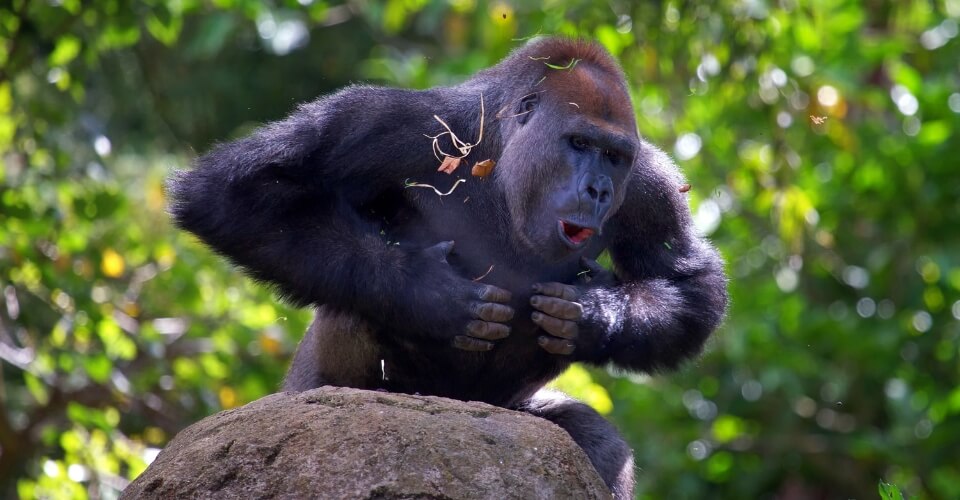Picture this: You are involved in a road rage with another biker. And a rider never backs down from a challenge. But before hashing it out with a race, you need to show who’s the boss. And often, the assertion is not displayed through trash talk but rather through a symbolic gesture.
With aggressive eye contact, you both twist the throttle. And suddenly, the biker backs off a little. He is intimidated and rides away. What prompted him to withdraw?
It was the exhaust sound– you are riding a Ducati, and he had a Kawasaki (just assume). Your bike made a more roaring sound, indicating that maybe your gear was superior to his. He got the signal and, hence, backed out.
The point is…. A sound is enough to indicate someone’s power.
The same concept applies to gorillas. It’s all about asserting dominance.
According to experts, gorillas beat their chest not to instigate a fight but to stoically suggest– “You Better Watch Yourself!” Their chest beat sound is actually a glimpse of what would happen if they got into a fight. The beat frequency corresponds to the gorilla’s body size.
Here’s a complete breakdown of why and what a gorilla’s chest beat means.
What Happens When a Gorilla Beats Its Chest?
Max Planck Institute for Evolutionary Anthropology conducted extensive research on gorillas and their highly evolved primitive instincts. And the inferences are nothing short of a thrilling gangster movie.
Edward Wright and his team from the institute dedicated 3000 hours to analyze the endangered mountain gorillas in Rwanda’s Volcanoes National Park, sponsored by National Geographic. They observed that the bigger gorillas produced sounds of lower frequencies using audio equipment to record chest beats. Experts deduced that this was because the more giant gorillas have larger air sacs near their larynx, thus making lower sounds as compared to smaller gorillas.
Male mountain gorillas, categorized as silverbacks, beat their chest, which produces a sound that can be heard more than 0.62 miles away.
Edward Wright, a primatologist, said–
“It is an extremely impressive display.”
“It can be a bit frightening. You don’t want to get in the way.”
Why Do Gorillas Beat Their Chest?
A male gorilla beat its chest an average of 1.6 times every 10 hours. Younger gorillas also perform chest beats to practice. But the bigger size (alphas) are not here to play.
These are the reasons why a gorilla beats its chest–
Do Gorillas Beat Their Chest to Show Dominance? A Matter Influence
The male is responsible for identifying the lingering threat and diffusing the situation as quickly as possible. When a gorilla beats its chest, it fist signals the opponent of what they are dealing with. As mentioned earlier, the beat frequency will determine the gorilla’s size.
Next, the chest beat is also a symbolic message to the opponent that they should be prepared for what’s to come. It is a form of exhibiting dominance. Experts believe that it is an “honest signal of competitive ability.”
Luring The Female
Estrus is a time when the female gorillas are entering their mating phase. When a male gorilla responsible for the tribe that protects these females performs the chest beat, it alludes that it wants that specific female gorilla.
Scientists believe that gorillas use this nonvocal communication to attract females and, in other cases, intimidate their rivals.
Typically, a male gorilla will stand on its two feet and cup its hands to thrust their pecs in an alternating pattern.
Maintaining Peace and Harmony in The Tribe
An alpha male is responsible for protecting his tribe and also leading them during migration. There may be conflicts within the tribe. The leader has to maintain harmony within. A chest beat can also be a signal of “all eyes on me,” which means that the tribe will have to obey the leader.
What Happens If You Pound Your Chest in Front of a Gorilla?
According to a few observations, a gorilla might likely charge at you if you start pounding your chest in front of them. It is similar to when you flick a finger at the biker next to you. You best believe you are up for some whooping.
What are your thoughts on gorillas beating their chest? Can you suggest other theories on why they use this as a signal?
Do you believe a gorilla is more dangerous than other predators? Let us know in the comments section below.

